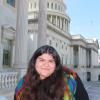I’m headed to Quito, Ecuador, next week to begin my studies at the Universidad San Francisco de Quito (USFQ). Much of my preparation has been fun and exciting—I’ve been gathering rain gear to prepare for Quito’s climate, emailing with my host, and selecting classes at USFQ—but I also devoted a surprising amount of time this summer to the more mundane task of getting my Ecuadorian student visa.
While the United States has friendly visa agreements with some countries—for example, many of my friends are studying in European Union countries and didn’t need visas for their semesters abroad—Ecuador requires American students to obtain a visa. To complicate matters, Ecuador recently revised its immigration laws, so the visa process I followed was new, different, and (at times) confusing.
IES Abroad offers students assistance in applying for visas through its IES Abroad ACCeSS program (where students mail their materials to IES Abroad, which submits them to the consulate), but that method of application requires students to temporarily give up their passports. I needed my passport for international travel this summer, so I had to apply for a visa on my own. Along the way, I learned a few important lessons.
1. I barely have fingerprints.
One of the first steps toward getting my Ecuadorian visa was completing a FBI background check. To do this, I first had to visit my local police station and get fingerprinted—which turned out to be a bit more complicated than I thought it would be.
According to the woman at the police station who took my fingerprints, I had some of the most difficult fingerprints she’d ever taken. She asked if I lifted weights (I don’t), did rock-climbing (I don’t), or played guitar (I don’t)—activities that might have created calluses on my fingers and made collecting my fingerprints more difficult.
Ultimately, she took three samples of my fingerprints and then threw out the first one. (The FBI requires two sets of fingerprints for a background check). Evidently, the two sets I sent in were good enough, because a week later, I received an official letter from the FBI stating that I have no criminal record.
2. What an apostille is.
In order for the Ecuadorian consulate to accept my background check, I had to get it apostilled. An apostille is a formal notarization—in my case, from the U.S. Department of State—certifying that my background check was indeed authentic.
3. The Ecuadorian consulate reponded quickly—once I turned in the right documents.
Because Ecuador recently revised its visa requirements, I was initially unclear on exactly which visa I was applying for and which documents were necessary for my application. As the summer wore on, I started to grow nervous that I wouldn’t get my visa in time. My local police department only does fingerprinting during very limited hours, my background check took a week after I sent in my fingerprints, getting the apostille took another week, and I had to get several documents translated into Spanish so that the Ecuadorian consulate would accept them. (Luckily, my IES Abroad program advisor recommended a translation service that was quite quick).
However, the Ecuadorian consulate was quick to get back to me about my application. Once I had uploaded all the right documents—scanned pages of my passport, a background check (apostilled and translated), a letter from my bank indicating I had sufficient funds (translated), a letter of acceptance from USFQ, and an ugly photo—the consulate approved my initial application within a few hours and let me proceed to the next step.
4. Phoenix in the summer is really hot.
In its physical form, a visa is an official-looking sticker which goes in my passport. In some cases, students can simply mail their passports to the consulate. However, since I needed my passport for travel this summer, I didn’t want to mail it without knowing when I could get it back. Instead, I had to bring my passport with me to an appointment at the closest Ecuadorian consulate. I’m from Colorado, so for me that consulate was in Phoenix, Arizona.
My consular appointment was fairly simple. I presented the physical documents that I had previously uploaded online, but I encountered a minor problem when it was time to pay my visa fee. The consulate’s processing system couldn’t verify my credit card, so I had to pay my visa fee by making a deposit at the nearest Bank of America.
I was alone in Phoenix alone without a car, which meant walking about 20 minutes each way in the 100-degree heat. I made the deposit at the bank, returned to the consulate, and was able to receive my visa—so I can definitely say that I sweated for it.
5. Things could have been more difficult if roles were reversed.
I was somewhat uncertain about the visa process, so spent a lot of time Googling “how to get a student visa to Ecuador.” Along the way, I stumbled across the opposite—the visa requirements for Ecuadorian students hoping to study in the United States.
As it turns out, getting a student visa for the United States isn’t exactly easy either. For example, according to the website of the U.S. Embassy in Ecuador, the United States recently tightened its visa requirements for all international visitors, requiring in-person interviews for all visa applicants between the ages of 14 and 79.
So while obtaining my visa was certainly stressful, I try to remind myself that I have little reason to complain. Now that I have all of my documents in order, I can’t wait to arrive in Ecuador next week. I anticipate many adventures to come—most of which will be much more exciting than the visa process. Keep following along!

Jessica Piper
I grew up in Colorado, but moved across the country to attend college in Maine. I'm an economics and Hispanic Studies double major with a minor in math, but writing is my real passion. I work for my college newspaper and have done other work for several blogs, magazine, and websites.








